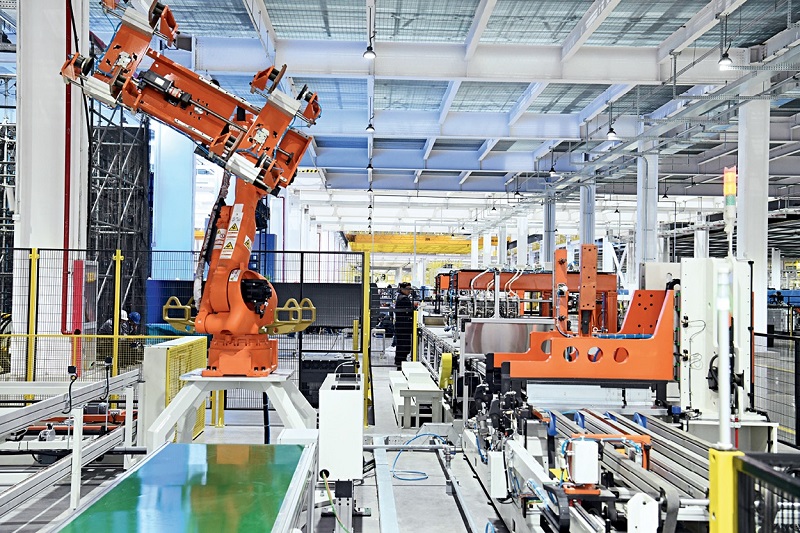More industries are embracing artificial intelligence to make production faster, smarter and with zero defect.

Haier’s interconnected washing machine factory in Tianjin in north China.
In home appliance giant Haier’s interconnected refrigerator factory in Qingdao in east China’s Shandong Province, robotic arms and technicians work together on the same production line, assembling refrigerators of various sizes, colors and types. Behind this production process is an extensive and sophisticated industrial Internet of Things (IoT) platform connecting and controlling all equipment.
The traditional manufacturing industry is undergoing a historic transition toward intelligent manufacturing, accompanied by technological advances, such as cloud computing, artificial intelligence (AI) and 5G. Haier’s interconnected refrigerator factory is part of this trend.
The smart factory is located in the Haier COSMOPlat Industrial Internet Ecological Park, which has an advanced industrial chain. The factory mass-produces customized fridges, that is, one production line can deliver refrigerators of different sizes, colors and types. Some have screens on their doors, some have more storage containers.
An AI-based control system adjusts the manufacturing process while different technicians complete specific tasks. Robots, using AI vision technology and automatic printing information loading technology, paste the energy labels on refrigerators, increasing productivity by 30 percent.
AI vision technology is also used during the quality control process. Through image recognition, intelligent analysis, camera imaging, and image comparison analysis, the factory ensures precise measurements and zero defects in products.
A Smarter “Brain”
The “brain” that connects all the manufacturing equipment at the factory is Haier COSMOPlat, one of the first smart manufacturing demonstration platforms in China. Launched in April 2017, the industrial IoT platform is ensuring manufacturing with intelligent customization.
For example, say model A and model B require different raw materials, assembly processes, and quality standards. During the production process, this information is transmitted to various workstations on the production line via a cloud-based system.
COSMOPlat has an independently developed Tianzhi industrial AI model, which feeds it with around 562 industrial data sets and over 3 million high-quality industrial data entries. This powerful AI model has a 96-percent reasoning accuracy and an 85-percent intent recognition accuracy. In 2024, it was included in the Ministry of Industry and Information Technology’s “Pilot Industrial Internet Programs” list.
AI models also help reduce manufacturing time and costs massively. For example, using an AI model to locate faults can reduce equipment repair time by 75 percent. In the past, it typically took a new employee about a year to become a qualified maintenance technician, and the training cost approximately RMB 150,000. However, with the AI-based intelligent maintenance solutions, this cost can be reduced to just one-tenth of the amount.

The Haier factory in the pilot free trade zone in Qingdao, Shandong Province.
Manufacturing Revolution
More than 100 factories of the Haier Group use the COSMOPlat. Besides Haier, COSMOPlat is also used in a range of industries, such as clothing, automotive, chemicals, molding manufacturing, and energy.
Qingdao-headquartered Ruihua Group, an apparel manufacturer, is one of the enterprises using this intelligent platform to transform its production process. Ruihua was struggling to meet the demand of the evolving foreign trade landscape. Then, it began to use COSMOPlat, adopting digital management in operations, such as warehousing, inventory checks, and material distribution.
Now, it takes only five minutes from receiving an order to finalizing the production scheduling. This has increased Ruihua’s production capacity from 9,000 to 12,000 garments per day, with a 150-percent rise in the added value of its orders.
From Haier’s interconnected refrigerator factory to its interconnected washing machine factory in Tianjin in north China, to Tsingtao Brewery’s factories, COSMOPlat has enabled many Chinese businesses to be included in the Global Lighthouse Network.
“Lighthouses” in manufacturing mean factories that have implemented Fourth Industrial Revolution technologies to evolve in scale, production, agility, and efficiency. The network is a World Economic Forum initiative, recognizing manufacturers who show leadership in using Fourth Industrial Revolution technologies to transform factories, value chains and business models. 
LU XIAO is a reporter with China Times.